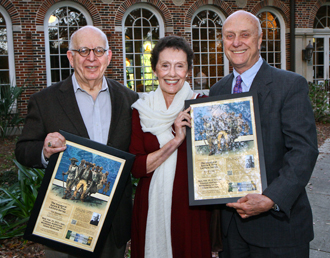Atlantic Creoles negotiated tricky cultural milieu
During the inaugural Sylvia R. Frey Lecture, sponsored by the New Orleans Center for the Gulf South at Tulane University, Ira Berlin described the historical experience of a group of people born into the cultural amalgamation that was the 16th century transatlantic economy, a group he termed the “Atlantic Creoles.”

Celebrating the inaugural Sylvia R. Frey Lecture are, from left, guest speaker Ira Berlin; Frey, emeritus professor of history; and Larry Powell, director of the New Orleans Center for the Gulf South. (Photo by Guillermo Cabrera-Rojo)
Berlin, author and history professor at the University of Maryland, described this group as individuals born to African mothers with European sailors or traders as fathers. They typically grew up speaking both European and African tongues, in addition to a common Atlantic Creole. They were natives to the unique hybrid environments created in places of cultural overlap, most particularly port cities.
“The business of Atlantic Creoles,” Berlin said, “was primarily trade, brokering the movement of goods through the Atlantic world. In the process, they began to become cultural brokers, and like all such people in the middle, were trusted by no one, but needed by everyone.”
Even when these Atlantic Creoles arrived in a new place, such as New Orleans, the &##x201c;transatlantic port city” environment gave them a familiar blueprint to negotiate within the European-style legal and economic system. Prior to the rise of plantations, said Berlin, lines between slave and free, black and white, were more fluid and less divisive, with both often working as indentured servants, or as working-class laborers.
When the plantation economy developed, it sucked in many Atlantic Creoles, creating a subgroup of slaves who, though black, were distinct in their culture and experiences from the rest of the slave population.
Atlantic Creoles, however, persevered as a cultural and demographic force, particularly in New Orleans. Throughout the shifts in power and social structures in the city, the group's unique cultural and linguistic heritage demonstrates that “the Atlantic Creoles have cast and continue to cast a long shadow throughout history,” said Berlin. The lecture took place on Wednesday (Feb. 29) in the Freeman Auditorium.
Cody Wild is a sophomore studying English and political economy.
